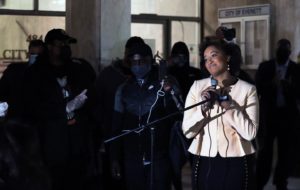
Black women are commonly stereotyped as too aggressive, too hostile, too angry. Categorizing us with these labels has caused Black women to question how we can look, dress, or even speak to provide a softer image to the outside world. These words can negatively impact our careers, our reputation, and how people look at us.
In 2019, I became the first Black, Haitian-American woman to be elected for the city councilor at-large seat in my hometown of Everett. I did not run with the label of being the first or being Black. I campaigned on issues critical to my city, and Everett needed the most qualified person in the seat. With my background, family experiences, and work history, I believed I was that person. During my campaign, I spoke about my graduating from Bentley University and obtaining my MBA from Boston University. I talked about how I had eight years of work experience in the corporate and nonprofit sector, and about being a small-business owner.
In 2020, my City Council colleagues went to the media and labeled me as too aggressive and said that my ideas were too bold for Everett. The labels reminded me of the many tropes Black women have historically heard for scores of years. I sat and reflected on whether I was too aggressive to be on the Everett City Council. I still had my career to think about and my small business to protect from the impact of COVID-19.
Being in the public eye, I noticed every moment was critiqued, including how I dressed or how I spoke. The extreme pressure to maintain my composure while being positive and likable was not what I expected. I learned to smile more. Smiling helped me to show the world that it cannot break me. I am stronger and have much more fortitude than that. People told me I had to be like Michelle Obama, and keep my composure and stay calm. Yet no one ever questioned the behavior and antics of my colleagues. After being in office for 10 months, I was asked by my colleagues in October to resign because I chose to keep my family safe during the pandemic by not attending closed-room meetings with up to 15 people, many of whom did not wear masks.
Being in politics is not about keeping the status quo; I want to create real change. I want people to relate to their elected officials. I want to speak my mind and, most important, I do not want to change who I am in order for my colleagues to like me.
As I reflect on this recent presidential election, I remember when people questioned and ridiculed our now vice president, Kamala Harris, when she laughed and smiled. I can only assume how she felt, having to stay calm, disciplined, and courageous in the face of adversity. Simultaneously, doing what many women, especially women of color, often do, balancing being disrespected while maintaining professionalism. Smiling and laughing to get through the journey of showing others the importance of a Black woman rising above being labeled as too aggressive.
At last week’s City Council meeting, the topic was linkage fees. The subject is important to me, since I have tried to fight for more funding to build affordable housing in a community that has needed it for 10 years.
During a robust debate with my colleagues on the issue, Everett Mayor Carlo DeMaria attacked me. The mayor said he wished he could turn off “pictures” of some members of the council on the Zoom meeting because they were “laughing” and not taking the issue seriously. He was referring to me. So I raised my hand to speak, knowing I could not stay silent. I told him that his wish that he could turn off the video of the only Black city councilor was disrespectful. He wanted me to disappear, to show viewers that my voice was not significant, and that I did not belong. However, being elected by the people of Everett in 2019, leading the race with the most at-large votes, I knew the community needed me. Yet he tried to embarrass me and make me feel like I did not matter.
Donald Trump did the same thing to Harris. Trump criticized her, saying she laughed too much. I wondered what it was about Black women that scared people like Trump and DeMaria.
As a woman in politics, I am consistently criticized about my hair, my looks, and how I speak.
I am proud to be a Black woman in politics. I will not change who I am or what I have to say.
No matter how others try to define me, I know this much is true: I smile because I like to smile. That will never change. I will continue to work hard on behalf of my city and my neighbors. Most of all, I do belong here.